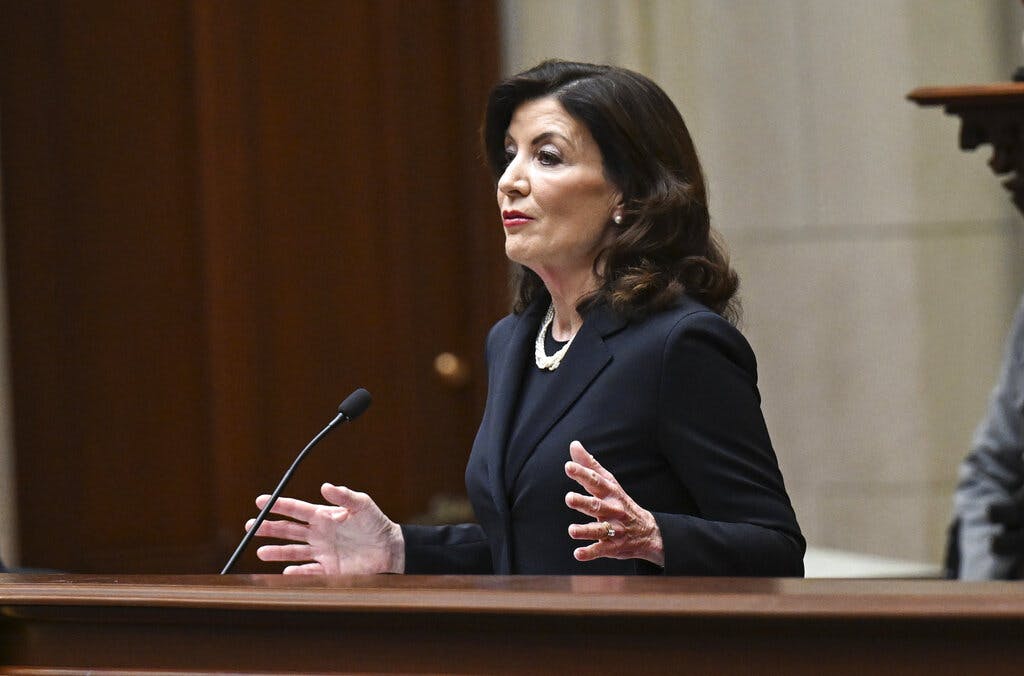Hochul Signals a Willingness To Revisit Bail Reform Law
Hochul’s desire to revisit the contentious law signals a moderation on her part.

Governor Hochul’s plan to revisit a 2019 bail reform law that many on the right believe is partly responsible for the state’s rising crime rates is putting her on a collision course with both the progressive wing of her party and Republicans who think she’s coddling criminals unnecessarily.
In her State of the State address last week, Ms. Hochul pledged to work with Democrats and Republicans to seek “improvement” to the law that she defended as “righteous.” The law is under fire from Republicans and moderate Democrats, and Ms. Hochul’s desire to revisit it signals a moderation on her part.
The law abolished cash bail for non-violent offenders and certain misdemeanors. During the 2022 campaign, Ms. Hochul was hammered by her Republican opponent, Congressman Lee Zeldin, who said the bail reform law contributed significantly to the crime wave New York has seen in recent years.
According to state data, while crime has risen most sharply in New York City, rates are up significantly across the state. In New York City, the total number of violent crimes increased by 11.3 percent in 2020. Statewide, violent crime increased by 7.8 percent, with the number of murders up 4.4 percent, the number of aggravated assaults up by 9.5 percent, and the number of rapes up by 10 percent.
New York law also bars judges from detaining certain people based on their propensity for “dangerousness,” meaning the judiciary cannot assess a defendant’s potential for violence and act preemptively. Critics, including Mayor Adams, have called for judges to be granted power to weigh dangerousness when setting bail.
The New York Civil Liberties Union — a major proponent of the bail reform legislation — says that the “dangerousness” standard is inherently racist. “In our racially unjust society, ‘dangerousness’ inevitably becomes a proxy for what race a person is,” the organization says on its website.
Instead of using a “dangerousness” standard, judges are required to use the “least restrictive” methods possible to ensure defendants return to court. Ms. Hochul’s new plan — which was released just before her address to the legislature — said the “least restrictive” requirement should be done away with, allowing judges to detain defendants before trial based on their potential threat to the community.
Ms. Hochul’s desire to change the law has met with mixed reactions from her fellow Democrats. A state senator who has long criticized the law as too lenient, James Skoufis, told News Nation he was “heartened” by the governor’s proposal.
Assemblywoman Latrice Walker of Brooklyn, a liberal defender of the law as it stands, is unhappy with Ms. Hochul’s plan. “Eliminating the ‘least restrictive means standard’ will send more people to jail without enhancing public safety,” Ms. Walker said in a statement, adding that “bail is not meant to be punitive.”
Last year, when Ms. Hochul initially proposed a similar reform to the bail law, Ms. Walker went on a nine-day hunger strike to protest the potential changes. “Hopefully people will understand that based on the fact that I am putting my life and my body on the line that we can really recognize how serious and momentous an occasion this is,” Ms. Walker told NY1’s Errol Lewis at the time.
Ms. Hochul also called for tougher punishments for those who use guns to commit crimes. New York ought to be “expanding bail eligibility for gun crimes” — meaning judges would have more discretion in setting higher bail in gun cases — and seeking “tougher prosecutions for gun trafficking.” During last year’s campaign, the governor often made stricter gun control her answer to Mr. Zeldin’s attack that she was soft on crime.
Despite her desired changes to the New York law, Republicans are continuing to highlight this issue in the Empire State.
Congresswoman Elise Stefanik, the number 4 House Republican, recently introduced federal legislation that would give states millions of dollars for enacting stricter bail laws. The bill — which is co-sponsored by all 11 congressional Republicans from New York — would allow states to apply for “anti-recidivism” grants from the federal government if they adopt stricter penalties for crimes like shoplifting, assault, and other misdemeanors.
“I am proud to lead this investment in our law enforcement and strengthen public safety. Far Left Albany’s reckless and dangerous bail reform policies have already put our communities at risk,” Ms. Stefanik said in a statement.
Congressman Anthony D’Esposito, a freshman representative who is a former NYPD detective, said that the legislation would “safeguard New Yorkers” in the face of liberal Democrats and prosecutors providing “pathways for criminals to escape punishment.”
Ms. Hochul’s move to grant judges more discretion in setting bail comes after a historically disappointing electoral result for her party. Her determination to introduce stricter bail limits represents a shift that is likely to upset the more progressive members of the legislature.

